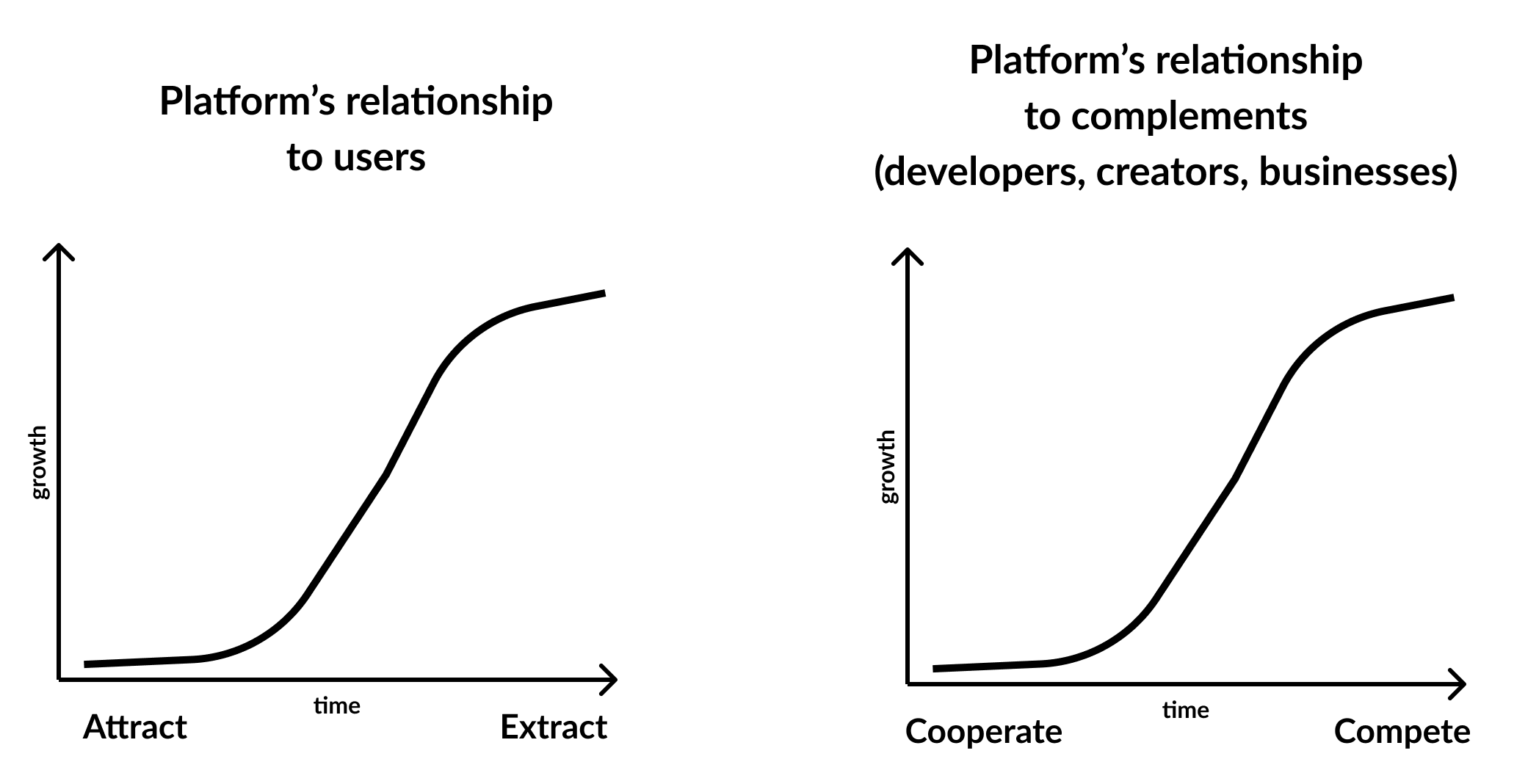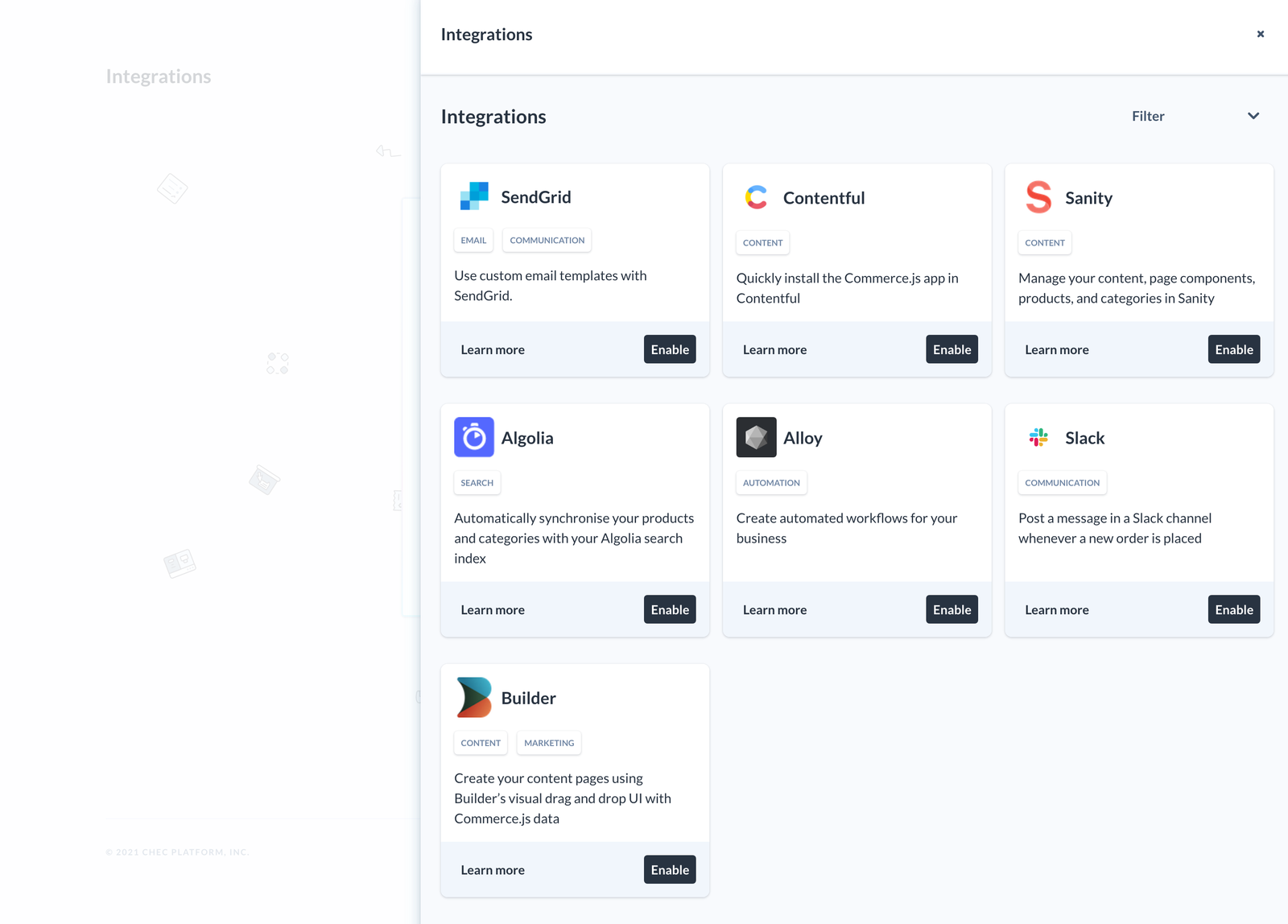Open integrations for commerce
 With this product release, we’ve made it faster for businesses to build and launch Commerce.js applications alongside best-in-class providers.
With this product release, we’ve made it faster for businesses to build and launch Commerce.js applications alongside best-in-class providers.
Not everyone has the resources or time to stitch together headless commerce applications from scratch, so we’ve created an incredibly powerful integrations suite to do the heavy lifting for you.
Our approach to commerce integrations empowers marketing and business teams to launch experiences with ease, while giving developers code-level control to adapt integrations as business objectives evolve.
The problem with traditional integrations
I’ve written previously about how traditional, monolithic eCommerce platforms entice businesses in with their broad feature sets, but how over time this works against businesses as they grow. With scale comes a greater need to own the customer experience, backend functionality that poweres thoese expereinces, and the data that flows through the business. Embedded within the platform approach to commerce, is a rigid integration protocol that also fails to serve businesses as they scale.
Let me explain.
Traditional integrations/plugins connect to 3rd party services in a predefined way that opens up access for both services to only perform specific actions. Integrations are set up in few clicks by non-developers, have configuration options, and then the integration is set. The issue with this approach is how prescriptive and locked down the platform makes the integration (partly due to how "one size fits all" these platforms are by default), making it impossible to alter the integration after it has been created.
Is this really a problem? Yes.

Businesses rely heavily on their integrations and plugins from day one, to the point where their organizational structure is often defined by the efficiency of their integrations. As businesses grow, their dependency on these integrations increases. When integrations are locked, and are not easily customizable, they provide less value over time. Business are then forced into a corner where they either custom build an entire integration from the ground up, or do nothing. Set and forget integrations breed a deferred maintenance mindset that ends up costing businesses in the long run.

Having personally spoken to hundreds of founders and CTOs of eCommerce brands in this situation, they essentially feel like their business is at the mercy of their platform, restrictive integrations, and plugins. This platform and integration dynamic ends up defining the growth and trajectory for these businesses, and not in a good way.
As more businesses transition to headless and composable architectures, the need for flexible integrations has never been more important.
Commerce.js integrations 🎉
Our approach to integrations gives the business control over their integrations from day one. When a merchant enables an integration, our API provisions an open source serverless function that can be invoked whenever certain webhooks fire from our API. This allows the serverless function to asynchronously perform certain actions on your behalf using secret Chec API keys, while keeping the API surface safe for public consumption.

This is powerful for businesses and developers for numerous reasons.
Integrations can be controlled and configured to meet specific business needs. After the initial provisioning of an integration, businesses can alter how our API communicates with the integration partner or application.
Integration availability isn’t limited by popularity. Businesses can create integrations for services they use, even if those services are bespoke for the business. This could be a custom warehousing software developed over the years or a bespoke invoicing system from a legacy tech stack.
Integrations, and the serverless functions that power them, are all open source. Developers have the freedom to fork, contribute, and build their own integrations that enhance the integration ecosystem for all.
Additional functionality is introduced to our admin dashboard with each integration, so we’ve made it possible to customize the dashboard with each integration. This can be leveraged by developers to configure a contextual experience for businesses when using integrations.
As integrations are isolated from the rest of the Commerce.js infrastructure, the physical location of the server running the integration is not pre-determined. We deploy integration functions “at the edge”, meaning it’s ready to run at a location closest to the business, with minimal latency.
A better approach
The plugin frameworks that traditional monoliths provide, are opinionated, proprietary, and result in a small talent pool of developers that can build and maintain these plugins.
Serverless functions are typically written in Node.js/JavaScript and so have much broader talent pools, making it easy to find developers to build an maintain your site. Commerce.js integrations are also less opinionated and the size of these integrations is much smaller, a few lines of code rather than large archaic files and module structures.
We believe our lightweight, open source integrations give business the freedom to compose, scaffold, and launch their commerce applications faster. Developers are not sidelined by integrations a business chooses to enable, but are instead empowered to make the integration more impactful for the business as they grow.
Available integrations
We’ve created an initial suite of integrations that build on top of our existing payment gateway integrations to cover content, search, communication, and automation.
For existing Commerce.js businesses, view and enable integrations in your account by heading to the new Integrations page.

In the coming weeks we’ll be rolling out additional integrations for email, marketing, embedded finance, tax, and shipping. We’ll also be releasing integrations with all major eCommerce platforms, making it easier for businesses to create break off campaigns and microsites with our headless checkout, without needing to completely replatform.
What integrations are we missing?
Commerce is a vast and rapidly evolving ecosystem, making it hard to satisfy everyones integration needs. None the less, we want to hear from you if you think there is an integration we are missing and that our community of builders and businesses would benefit from.
Please reach out to us to chat about what integrations you’d like to see!
Build your own integration
Don’t want to wait for us to create your desired integration? Check out our integration template and create your own.
Once you’ve created your integration, we’ll add it into your dashboard so you and others can start using it!
An open era for commerce
Striking a balance between no-code tooling, and ultimate developer control is not an easy task, but we’re excited by how this integrations release allows businesses to own more of their commerce and integrations.
We’re excited to add more integrations for the Commerce.js community and work with business as they innovate on top of our commerce infrastructure.
Ready to take control of your commerce?
Leverage our headless backend to build product, cart, and checkout experiences as per your requirements.
Speak to our expert team or sign up for free today.

